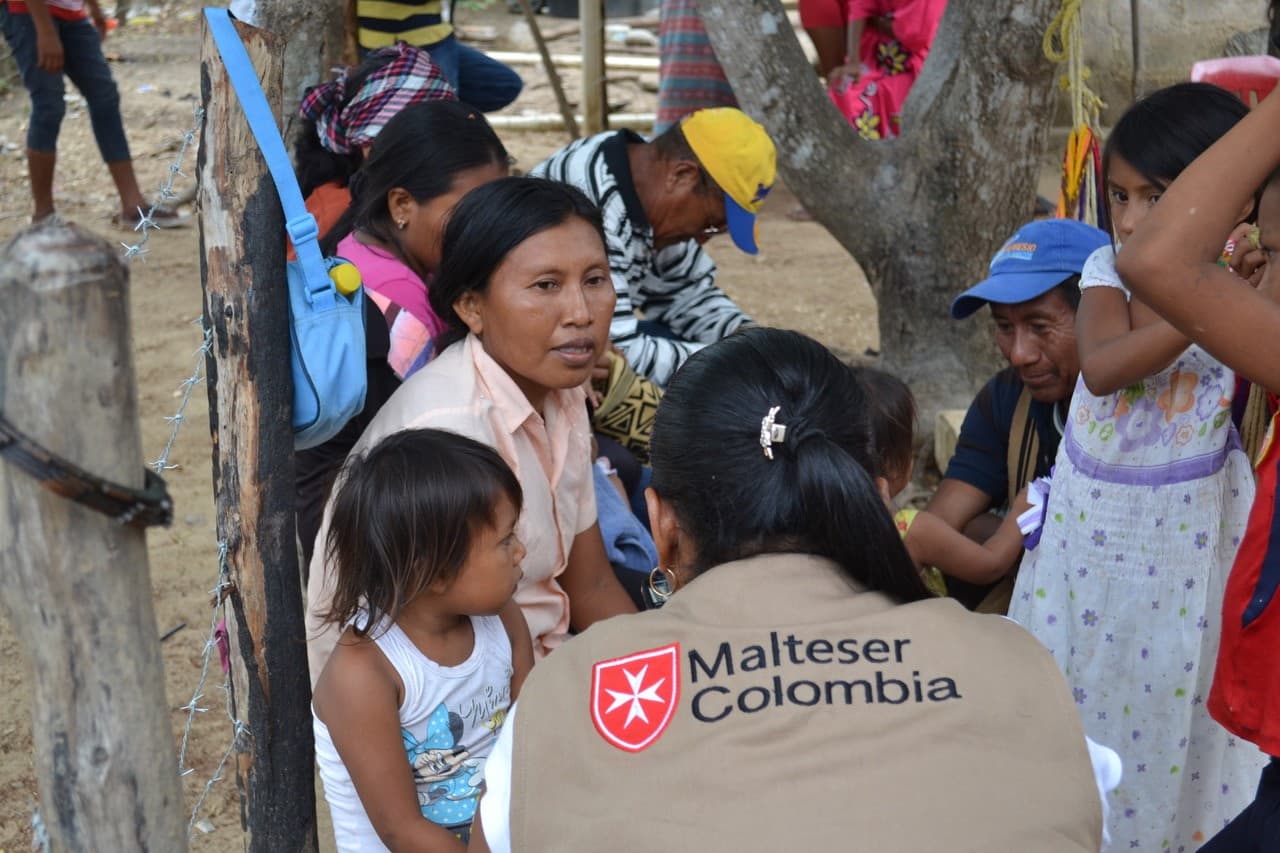Malteser on the scene for South American refugees

According to UNHCR, Colombia is the host country in the Americas most directly impacted by the political and socio-economic situation in Venezuela. Official estimates from Migración Colombia and UNHCR state an influx of 796,000 Venezuelans in 2017. Unofficial numbers suggest that the daily migration has increased substantially in the second semester of 2017 with 6,000-10,000 people crossing official and unofficial border crossings daily, seeking refuge in Colombia. There are daily peaks of up to 37,000 people crossing the border. The total numbers in 2018 could rise as high as 2 million refugees and migrants entering Colombia legally and illegally from Venezuela. Venezuelan refugees are now entering rural as well as urban host communities which are already extremely poor, with high numbers of chronic and acute malnutrition, as well as limited access to health and other basic services. The absorption capacity of host communities is therefore very limited and the daily increasing number of refugees is increasing strain on the host communities. First xenophobic tendencies have already started in the host communities, as daily labor rates drop as Venezuelans are hired far below minimum wages in the informal sector and as criminality rates increase due to an increasing struggle for survival of the refugees. Furthermore and due to a huge gap in medical services already in Venezuela, many refugees arrive in a state of sickness and with incomplete vaccination schemes, reintroducing diseases that were already eradicated or very low in occurrence, such as measles, malaria and diphtheria. This situation is very worrisome and requires immediate action to contain potential outbreaks.
The current situation of the refugees in La Guajira is dire. Families are sleeping in parks and public places in the urban centers without access to food or basic services in visibly bad nutritional and health conditions. An internal assessment of MI Americas discovered that many children have incomplete vaccination schemes. Pregnant women do not have access to prenatal care, newborns are not attended, and there is no access to postnatal care. Many children and pregnant women also show signs of acute malnutrition. Furthermore due to their often illegal status, refugees are particularly vulnerable to discrimination, exploitation, extortion, violence, sexual abuse, etc
For Malteser, the main focus will remain on emergency health and nutrition assistance via mobile health brigades, as there is an existing gap in La Guajira in the access to primary health care services and to contain potential re-introduction of already eradicated diseases and ensure health care for most vulnerable population (children, pregnant women, newborn, etc.). This result will be conducted by medical mobile teams, composed of full time medical staff and part time medical volunteers from other national medical actors (medical universities, private sector, medical foundations, etc.). Focus will be on: 1) primary health care and provision of medical consumables and medicine; 2) vaccination status check and vaccination in case of incomplete vaccination scheme in collaboration with IPS (official medical service provider); 3) nutrition status check especially of children and pregnant women, in acute cases of malnutrition treatment with plumpynut; 4) pre- and post-natal care, medical care for newborn babies.
Secondary focus will be on assistance to particularly vulnerable indigenous refugees and integration into host communities through the establishment of productive systems. This could be expanded to other rural Afro-Colombian and campesino host communities to facilitate integration of returnees. All of these rural communities are already extremely poor and mainly composed of internally displaced people which were all affected by the internal Colombian conflict. Considering the principles of do no harm, activities need to include host communities.
MI Americas current emergency response
Malteser International allocated internal funds to provide services to about 5,000 affected people but will most definitely need additional funds to scale-up our interventions to reach more people. Our initial response includes the following interventions in collaboration with our local partners, local government entities and community members:
- Emergency health and nutrition assistance to Venezuelan refugees and distribution of hygiene kits
The activities will include primary health care, provision of medicines, hygiene kits as well as vaccination and nutrition services via mobile health brigades and in coordination with local state and non-state health actors.
- Integration of indigenous Venezuelan refugees into indigenous host communities
In order to create long term livelihood opportunities and to integrate indigenous refugees into host communities, productive systems will be established, benefitting both, host communities and refugees.
Why MI Americas is well positioned for an immediate response
MI Americas has been working since several years in La Guajira and counts on a strong network with humanitarian and development state and non-state actors, including the private sector. The current response activities are coordinated with a wide network of actors including the Health Secretariats on district and department level, the municipal government secretariat of Riohacha, Red Cross, Migración Colombia, Colombian army, IPS Anashiwaya (national health service provider), Chevron’s Fundación Baylor (private sector), UNHCR
Due to ongoing development oriented projects in health and rural development, MI Americas has an established and experienced team and access and deep knowledge of remote indigenous communities not reached by other actors and often of difficult access. Especially the Wayuu are very closed towards outside actors; having gained access and trust over several years is an important precondition for working in their communities.
Donate by Clicking Here



